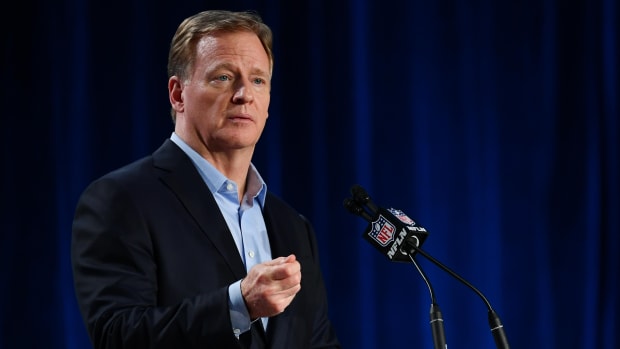NFL commissioner Roger Goodell addressed the league's handling of Kapernick's national anthem protest in a conversation with former NFL linebacker Emmanuel Acho.
In speaking with former NFL linebacker Emmanuel Acho on his YouTube show, "Uncomfortable Conversations with a Black Man," NFL commissioner Roger Goodell addressed the league's handling of Colin Kaepernick's national anthem protest.
Goodell offered an apology to Kaepernick, saying he wished the league had listened to the quarterback's reasoning for kneeling sooner.

“I wish we had listened earlier, Kaep, to what you were kneeling about and what you were trying to bring attention to." Goodell said. "We had invited him in several times to have the conversation, to have the dialogue. I wish we had the benefit of that, we never did. We would have benefited from that, absolutely.”
Goodell said he'd talked to numerous players around the time Kaepernick began kneeling during the national anthem in 2016, including Kenny Stills, Eric Reid, Malcolm Jenkins and Anquan Boldin. He said he regrets how the players' message in kneeling for the anthem was misinterpreted as being anti-America or anti-military.
“It is not about the flag. The message here, and what our players are doing, is being mischaracterized," Goodell said. "These are not people who are unpatriotic, they’re not disloyal, they’re not against our military. In fact, many of those guys were in the military, and they’re a military family. What they were trying to do was exercise their right to bring attention to something that needs to get fixed. That misrepresentation in who they were and what they were doing was a thing that really gnawed at me.”
This year, as protests began across the country in response to the murder of George Floyd, Goodell says that message the players have been trying to communicate became clearer to him, and he's hopeful the public reaction to players kneeling during the anthem in the future can become more favorable.
“It was horrific to see that play out on the screen," Goodell says of Floyd's killing. "There was a part of me that said, ‘I hope people realize that’s what the players were protesting.’ And that’s what’s been going on in our communities. You see it now on television, but that’s been going on for a long, long time. And that’s where we should have listened sooner.”

0 Comments:
Post a Comment